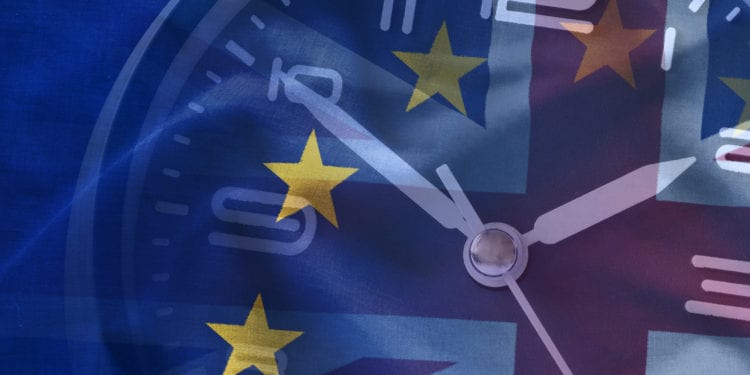How Brexit is impacting business aviation ops to the UK

On Dec. 24, 2020, a BREXIT deal was officially reached for the United Kingdom (UK) to exit the European Union January 1, 2021.
Although the exit is now official, many details are still unclear. We will continue to keep this blog updated as more becomes known. In the meantime, here’s everything we do know about how BREXIT and some of the primary ways business aviation could be impacted.
Useful BREXIT links
Transition website: The UK has established a transition website that will continually be updated: https://info.caa.co.uk/uk-eu-transition/
It has also created a flowchart on aviation safety for the UK leaving the EU.
You can also sign up for updates at: SkyWise.caa.co.uk.
Potential air routing changes
In 2019, both sides agreed to preserve basic connections under no-deal, but potentially UK airlines may be prevented from flying routes within the EU, and EU airlines to and from the UK.
Services could be restricted as the UK would need bilateral agreements with countries inside and outside Europe. The UK is opting out of the European Aviation Safety Agency (EASA). A deal should mean some of the rules that govern and manage our industry remain similar to today, but no deal could mean some changes happening on the 1st January.
If an agreement is reached, it is expected that rights and freedoms would be transferred in one form or another, but until written, we can’t know what that will look like.
Aircraft Importation
We are still awaiting some clarity on the importation status of aircraft imported into the EU via the UK to gain free circulation. We would recommend speaking to legal counsel should you have concerns about the importation status.
The UK has been a popular choice for importing aircraft into the EU. One reason is the effective VAT rate on aircraft was 0 percent. There is no certainty at the moment that these imports will still be valid in the result of a no deal Brexit. This will result in many operators finding that they will need to reimport their aircraft very quickly to avoid any issues when operating in the EU. We highly recommend checking the import status with your legal counsel and your importation specialist and whether they may be impacted by either Brexit scenario.
UK Charter Permits
The UK and individual EU member states are now negotiating traffic rights between the nationals carriers and UK carriers. This may result in different traffic rights from one country to another based on reciprocal arrangements.
All non-UK air carriers that wish to undertake commercial services to, from or within the UK are required to hold a Foreign Carrier Permit before that flight is undertaken. Currently, EEA and EFTA air carriers are permitted to undertake services to and from the UK without the need for a permit, provided those flights originate from or are destined for territories within the European Common Aviation Area. EEA carriers are also additionally able to undertake services within the UK (cabotage flights) without a permit.
If there is no reciprocity to these operations in the Brexit deal, or the UK leaves without a deal that will change and will result with the EU operator needing to apply for an FOP to grant access for every passenger carrying sector into or out of the UK and in this scenario it would be highly unlikely to be granted an FOP for cabotage flights within the UK.
It’s interesting to note that the EU does not control a consolidated charter permit process for all member states and it is left to each member state to manage its own process independent of others. Therefore, UK operators may not be so adversely effected unless wanting to perform, for example, a point-to-point service in France.
The UK is now in a negotiating with the 27 countries that make up the EU bloc as there is no central EU authority that manages this on behalf of member countries. UK would like reciprocal arrangements with each state but there is no guarantee this will happen. Non EU countries probably won’t see much change but EU charter operators may for example no longer be able to fly between Edinburgh and London which is cabotage if their country of registration has not entered into a reciprocal arrangement with the UK.
The UK CAA will continue to recognize an EASA TCO so long as it remains valid until 2022 and they will be contacting these operators in due course and invite them to apply for a UK TCO, operators that do not already hold an EASA TCO will need to apply for a UK TCO before being able operate to and from the UK.
Here is a handy ICAO reference to the nine aviation freedoms, https://www.icao.int/pages/freedomsair.aspx.
For more information, feel free to contact me directly.
Licensing
As of Jan. 1, 2021, the UK Civil Aviation Association is no longer a European Union Aviation Safety Agency participant.
According to UK Civil Aviation, “Though the existing EASA regulatory framework will cease to apply, all current substantive EU requirements will be retained in UK domestic regulation.
All EASA certificates, approvals and licences in effect on 31 December
2020 for use in the UK aviation system and on UK-registered aircraft will
be recognised by the CAA for up to two years.
This document is a short summary of the conditions that an absence of agreement would create and what the CAA and UK Government have put in
place to maximise stability for passengers and the aviation and
aerospace sectors. https://publicapps.caa.co.uk/docs/33/Aviation%20safety%20after%20the%20UK%20leaves%20EASA%20(CAP1714).pdf “
More helpful links:
- https://www.caa.co.uk/licences/
- https://publicapps.caa.co.uk/docs/33/Aviation%20safety%20after%20the%20UK%20leaves%20EASA%20(CAP1714).pdf
For more information, feel free to contact me directly.
Customs
Aircraft parts could be subject to new import duties. For example, if you need a Dassault part to be shipped to and from the UK from France to fix your AOG there could be import and export duties to pay not to mention delays in transit whilst these fees are worked out and paid.
The amount and value of goods that you can bring into the UK may also change. Currently, you do not need to pay duty or tax on goods that you bring in from the UK as long as you transport yourself, will use yourself or give them away as a gift and have paid duty and tax in the country that you bought them.
If the UK leaves without a deal this could change meaning, you would have to declare goods when arriving into the UK from the EU and vice versa. There are also big differences in allowances. The links below highlight the allowances for arriving from the EU and from outside the EU.
- https://www.gov.uk/duty-free-goods/arrivals-from-outside-the-eu
- https://www.gov.uk/duty-free-goods/arrivals-from-eu-countries
Examples of the current allowances for flights:
- From the EU you can currently bring up to 90 liters of wine, 10 liters of spirits, 110 liters of beer and 800 cigarettes before you may need to be asked any questions.
- From outside of the EU you can only bring up to 16 liters of beer, 4 liters of wine, 1 liters of spirits and 200 cigarettes.
When claiming back VAT on high-value goods, the paper work processing must be done at the last port of exit from the EU. After Brexit, passengers should remember to claim back their VAT before travel to the UK as UK customs will not be able to authorize their refunds, and likewise when leaving the UK for Europe claim at the FBO before boarding.
Immigration
The changes in a no-deal scenario are still not clear.
EU and other non-visa nationals will not require a visa to enter the UK when visiting the UK for less than six months, but may require a visa if entering the UK to study or work. Entry into the UK for other non-EU countries will remain unchanged.
There will be changes coming to the General Aviation Report (GAR), and we are waiting for updated formats from UK Border Force to be circulated.
Pet Travel
UK pet passports will no longer be replaced when they expire. We recommend anyone who uses a UK pet passport to consider getting an EU passport for their cat, dog, or ferret or to use a health certificate issued at your veterinarians.
Remember, you must be an approved carrier to transport pets into the UK and only AOC certified operators can apply for pet carrier status.
Conclusion
The UK has officially exited the EU, impacting several areas of aviation. As of publication, many of the details were unknown. This article will be kept updated as more is finalized.




